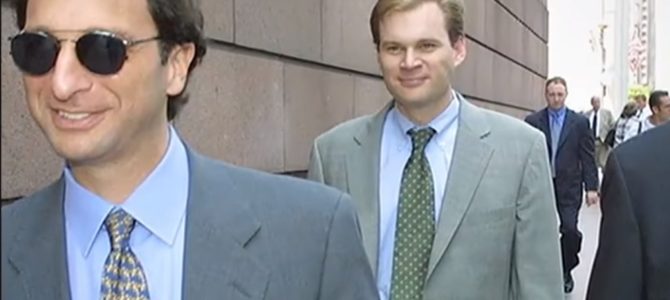
In investigating Donald Trump’s alleged collusion with Russia to steal the 2016 election, the media have found no story too small, no detail too minor to cover. Each leak that can be even remotely tied to the narrative of Russia harming America with the Trump campaign’s help is exploited and hyped for round-the-clock attention. To give just one example, CNN ran a report in May dramatically headlined “First on CNN: AG Sessions did not disclose Russia meetings in security clearance form, DOJ says.”
The story said Sessions failed to note at least two meetings with Russian Ambassador Sergey Kislyak on his security clearance form. CNN alleged the form requires him to list “any contact” he had with any foreign government or its representatives. “The new information from the Justice Department is the latest example of Sessions failing to disclose contacts he had with Russian officials,” the story alleged, driving the Russia-Trump collusion narrative.
Many other media outlets followed CNN’s lead, including the Washington Post, Politico, ABC News, and others.
Earlier this week, more than six months after the initial worrisome report ran, CNN ran a brief update noting that, well, it turns out Sessions never had to disclose those meetings as part of official government work, and was told that at the time he filed his clearance form. The weirdest part was that the Department of Justice told CNN that originally, but the breathless report was filed and hyped in any case.
Many media outlets have pursued the Russia-Trump collusion narrative with such wild abandon that it’s almost comical, even though more than a year into the conspiracy investigation, there remains no evidence that Trump colluded with Russia to steal the 2016 election. In fact, the lack of any evidence is itself becoming a story, as people try to figure out more about why the FBI was investigating the Trump campaign in the first place, and why there were so many selective leaks hinting at a broad conspiracy that has yet to materialize.
So how do the media handle dramatic updates that run counter to the narrative they’ve been pushing? This week, text messages sent by Peter Strzok, a chief investigator of both the Clinton email probe and the Russia collusion probe, were released to Congress. Some of them stood out:
In August 2016, Strzok, who played a lead-investigator role in the Hillary Clinton–emails investigation, flatly stated that the FBI could not ‘take that risk,’ referring to the possibility that Donald Trump might be elected president. He made the statement in a message to Lisa Page, a bureau lawyer with whom he was having an extramarital affair. Strzok referred to an alternative FBI ‘path’ regarding Trump’s ‘unlikely’ election that Page had proposed during a meeting they’d attended in ‘Andy’s office’ — meaning deputy director Andrew McCabe, the bureau’s number-two official, second only to then-director James Comey.
The texts, which displayed a high degree of animus toward Trump, also referred to an “insurance policy” of some kind to deal with the threat of his successful candidacy. The context of the texts remains to be learned, but there is no question that if such texts and conversations were discovered against the previous president, they would be front-page news for weeks on end.
It will surprise no one that these texts were not covered with the same obsession that leaks regarding Russia have been covered. Here are some of the weaker ways that journalists and pundits responded to the news of the FBI’s “insurance policy” texts, instead of covering them like they cover news that is negative for President Trump.
1. These Were Private Texts!
Benjamin Wittes, editor in chief of the Lawfare blog and a senior fellow at the Brookings Institution, is a close friend and ally of former FBI Director James Comey who has helped him leak information to the press. He’s fond of tweeting out “tick-tick-tick” when leaks supporting a Russia collusion narrative are published. With this release of information, he had a much different approach:
The release of private correspondence between two Justice Department employees whose correspondence is the subject of an active inspector general investigation is not just wrong. It is cruel.
The text messages released to Congress were exchanged by FBI agents on FBI phones dealing with FBI matters. In no world is this private communication.
2. Leaks Are Suddenly, Briefly Bad
Natasha Bertrand is a reporter receptive to publishing storylines from the opposition research firm that put out the Russia narrative — Fusion GPS — as well as leaks from Democratic intelligence sources. But with the news of these texts, she became someone deeply concerned about leaks.
Her only two stories on the matter are not on the substance of the texts and what they indicate about the Russia and Clinton probes but, rather, whether the release of the texts was authorized. See, “In ‘highly unusual’ move, DOJ secretly invited reporters to view texts sent by ousted FBI agents” and “DOJ now says early release of FBI agents’ private texts to reporters was ‘not authorized’ by the department.”
Perhaps a year into a story based on nothing but a leak campaign against Trump officials is a bit late to express concern about communications between intelligence officials and reporters, particularly when in this case the emails were released to Congress.
Jonathan Chait and Max Boot also got the talking point to focus on how awful it was for the Department of Justice to release texts that were written on FBI equipment about FBI issues by FBI agents that led to a top FBI agent’s removal in a politically charged probe.
3. It’s Just Totally Normal Political Opinions
Jerry Nadler, the House Judiciary Committee’s top Democrat, said, “Peter Strzok wasn’t saying anything about Donald Trump that the majority of Americans weren’t thinking.”
It’s a cute line that was parroted by many in the media. And it’s true that FBI agents are allowed to have political opinions. But there are multiple problems with the sentiment, including that “the majority of Americans” aren’t tasked with investigating one, much less both, of the major-party candidates in a presidential election.
And if it were true that there were no problem with these totally normal political opinions, why did special counsel Mueller remove Strzok from the probe when he discovered the texts?
4. Strzok Also Lightly Critiqued Bernie Sanders, So There’s No Problem
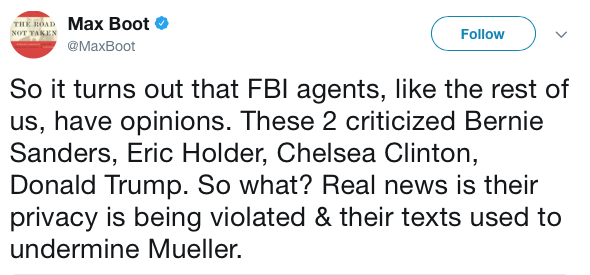
“FBI Agent ‘Scandal’ Revealed To Be Even More Stupid Than Previously Known” wrote Chait, for similar reasons to what Boot gave above.
This wouldn’t even be a good talking point if Strzok were investigating Chelsea Clinton and Bernie Sanders. But it’s a particularly bad talking point when they’re not. And it bears repeating: If these comments were no big deal, why was Strzok removed from the probe and shuffled off to human resources? Or, as Chuck Ross put it:
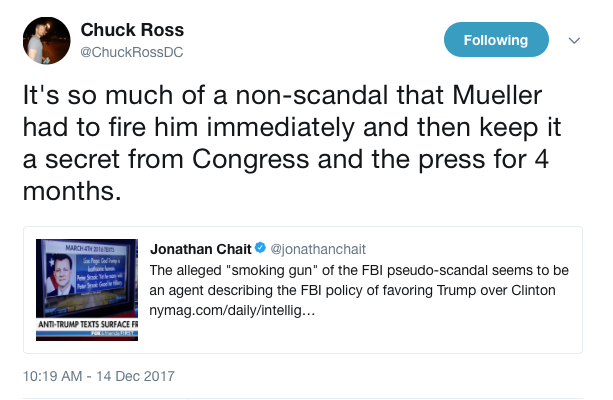
5. In a Way, These Texts Prove the Russia Collusion Narrative
As the many investigations grind on in search of any evidence that the Trump campaign colluded with Russia to steal an election, some people still cling to the Russia-Trump collusion narrative. CNN analyst Asha Rangappa is representative:
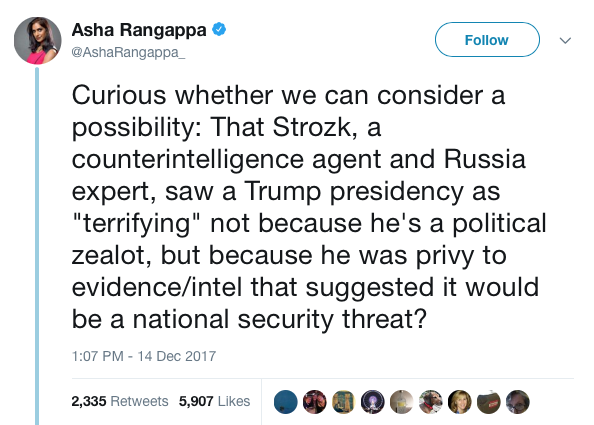
Well, it’s impossible to know for sure, but at some point this claim — that evidence of Trump colluding with Russia to steal an election is just around the corner — begins to be more difficult to put faith in.
6. It Was Just Stress, Man
The Wall Street Journal‘s Del Quentin Wilber had perhaps the sweetest defense of the texts. He admits that Strzok and his paramour didn’t like Trump, but, you know, they didn’t like a lot of people. And, “They were in very high stress positions and worked many, many hours. I cannot imagine the pressure on Strzok as he led the HRC investigation.”
And “Affairs by agents and others in high-stress law enforcement jobs – I have covered everyone from cops/homicide detectives to agents to prosecutors – are fairly common.” And that “insurance policy” text was perhaps just a joke. Also, they took their jobs extremely seriously, but not so seriously that they remembered not to text messages like this on work cell phones or to have casual and wordy chit chat with the people they’re cheating on their spouses with. I was mildly surprised to not see the texts blamed on this war and that lying SOB Johnson.
Again, though, this is a sweet and charitable defense of Strzok and Lisa Page. It’s perhaps noticeable because we don’t usually see such charity extended to members of the Trump administration and campaign who have been covered as potential Russia colluders and traitors.
7. Doesn’t Matter Because Strzok Was Kicked Off the Team in July
People who are beginning to connect the dots about the ongoing leaks regarding the Trump-Russia collusion narrative, and the role the FBI played in that narrative, have a different reaction to the texts than do strident critics of the Trump administration.
The latter say there is nothing to be concerned about because Mueller removed Strzok in July. That’s true, but it doesn’t explain why Mueller waited so long to tell inquiring members of Congress about the change, and it tells us nothing about the important role Strzok played in the year prior to his departure.
He was a key investigator in the Hillary Clinton probe into her mishandling of classified information. He opened the Russia-Trump probe. He interviewed most of the key players and shaped the investigations. Did Mueller review any aspect of his handling of the Russia probe? And why did news of the circumstances surrounding his departure only leak after Mike Flynn pled guilty? These, and other questions posed here.
8. Ignore, Ignore, Ignore
Of course, the most common media response to the texts has been to downplay or even ignore them. The New York Times begrudgingly covered the story, but somehow managed not to mention the “insurance policy” text.
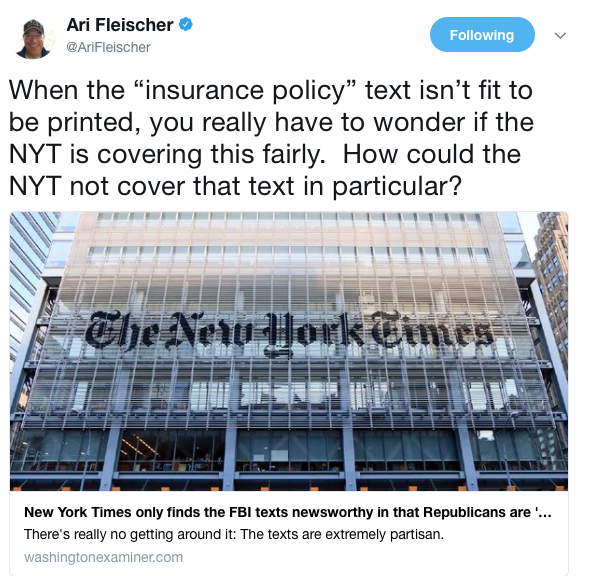
There were other problems with The New York Times‘ coverage as well.
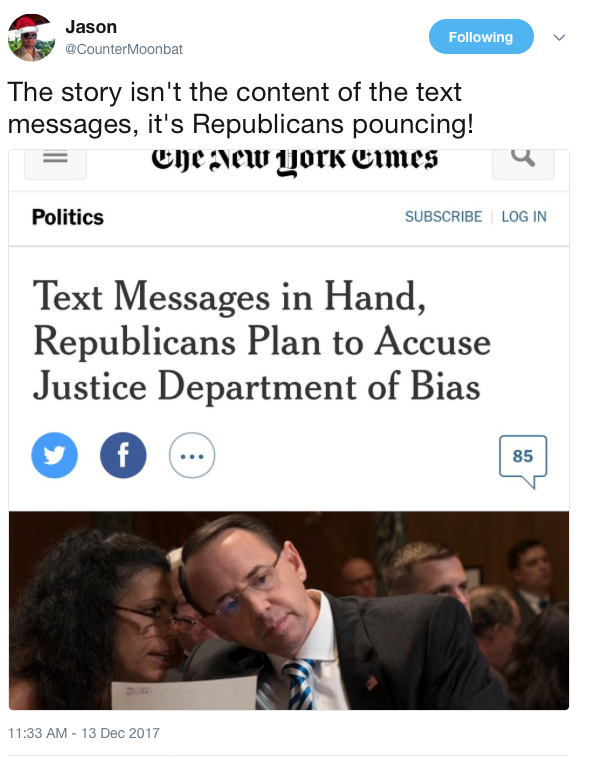
As Jason Beale wrote, “The most consistently damaging manifestation of journalistic bias isn’t “Fake News”, corrections and retractions of misreported stories, or one-party leaks – it’s this insidious manipulation of the tone, tenor, and substance of straight news such as this.”
CNN’s initial story failed to even quote any of the texts.
The Wall Street Journal‘s Kim Strassel states the obvious: “Press is focusing (deliberately) on Strzok texts expressing hostility to Trump, and noting it is OK for agents to have political opinions. Press needs to to focus on the messages suggesting he’d act on that hostility (‘insurance policy’)–which is not OK.”
Oddly enough, Drudge didn’t mention the texts and has downplayed all Strzok-related coverage. Some NeverTrump conservative media have also downplayed it.
Many media outlets have buried their reluctant mention of these texts, almost as if they feel the texts are an indictment of their own uncritical coverage of the collusion narrative put forth by partisans.
Let’s at Least Pretend to Care about Covering the News
Listen, we have much to learn about the FBI’s Trump investigations, their use of Clinton opposition research to wiretap an associate of the Trump campaign, the orchestrated leak campaign in the waning days of the Obama administration, and Strzok’s role in any of these. The texts require greater elucidation.
But journalists should seek to cover this story, not cover it up or downplay it before the American public gets answers it is counting on journalists to help them get.





